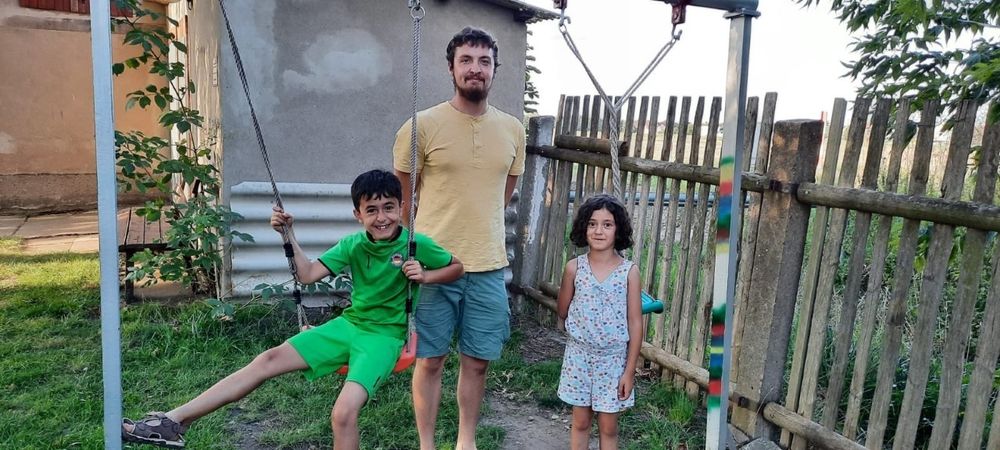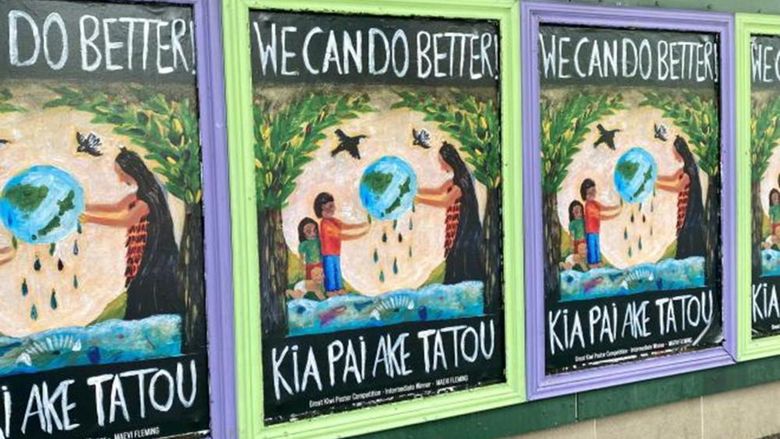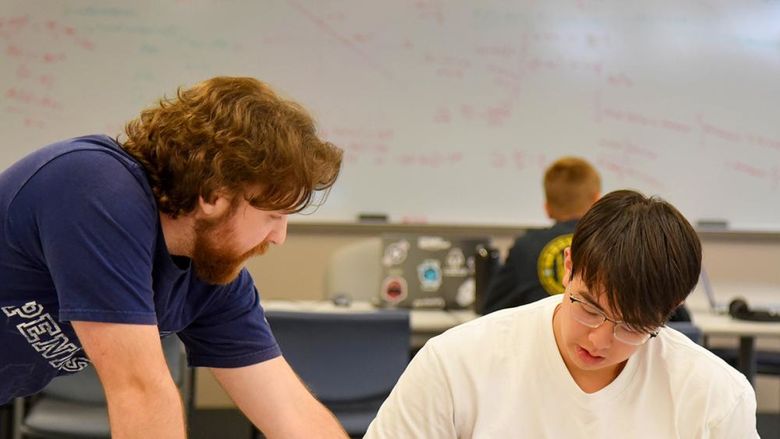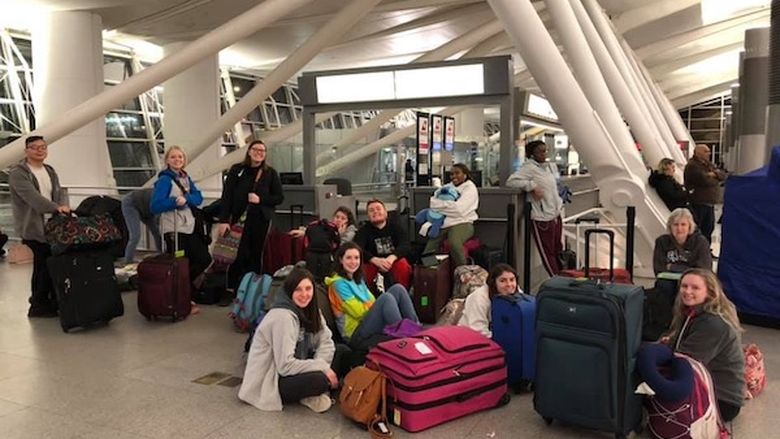
Haldan Jacobson and two of his students, Avin and her brother Armaj, at their home in Halle, Germany.
It’s not uncommon for college students to complain about having to take a required language course. They can be one of the most challenging parts of a student's education. Penn State Harrisburg alumnus Haldan Jacobson could have fulfilled his language credits as quickly as possible and moved on, barely to remember even a few words soon after graduation.
Instead, the further he progressed, the more he realized that language is a key that unlocks doors of opportunity, discovery and travel.
The First Door
When Jacobson’s Jewish grandfather was forced out of Germany in 1939 due to threats from the Nazi regime, authorities also revoked his citizenship. In 2011, Jacobson and other family members were offered restored citizenship as part of Germany’s reparation program.
Jacobson was proud of his Jewish ancestry and German citizenship. Still, it wasn’t until his first year at Penn State Altoona, when taking his first German course, that he began to appreciate this connection and nourish his roots. “I started to really get into it and grow to understand it. I began to learn about German history and see it as part of my own.”
In 2019, after two full years of German courses, Jacobson had the opportunity to try out his fledgling German skills through a volunteer program that took him to the tiny town of Hermeskeil in southwestern Germany.
“I saw traveling to Hermeskeil as the culmination of my studying and immersion in German language and history. It was a way to push all of that.”
And to push himself. Shortly after arriving in the country, as Jacobson was trying to figure out the train and bus system, he found himself sitting on a bus stop bench, alone, somewhere deep in rural, southwestern Germany with no wi-fi. “The fact that my German was at best conversationally fluent for a primary schooler did not faze me. It was a little bit frightening but also empowering and liberating. I was there, and the only person I could rely on was myself. That was the point.”
Jacobson managed to get himself to the correct location—Grimburg Castle. For ten days, he stayed in the halls of the castle, where he and others in the volunteer group helped maintain the structure and its grounds, set up a Renaissance Festival for Father’s Day and worked at a local museum. He visited and explored nearby towns, interacted with locals, went on hikes and attended music festivals.
But it wasn’t those things that had the most significant impact on Jacobson. It was sitting around the fire at night sharing bier, borscht and backstories with other members of the volunteer group that really moved him, fostered a sense of connection and bolstered his role as a citizen of the world. Volunteers included young adults from Hong Kong, Vietnam, Ukraine, Turkey, France and Russia. “Sharing our personal experiences and listening to those of others creates bonds that transcend cultures. It was really interesting and special.”
Jacobson had two influential German instructors and mentors at Penn State Altoona. Anja Wagner laid the foundation his first year, and Jutta Gsoels-Lorensen took over from there.
As an associate professor of German, English and comparative literature at Penn State Altoona, Gsoels-Lorensen always encourages her students to think about language study critically and apply the benefits to undergraduate education and beyond.
So she was thrilled to watch Jacobson take advantage of the volunteer opportunity. “Learning another language means wanting to be at home in more than one place,” she said. “I know that students, deluged by grammar rules and tricky new words, can feel lost in the undertaking, but the work behind becoming competent in another language translates into the ability to form a connection and arrive at understanding where tourists can only point and smile. Given the transnational nature of today's most urgent issues, what could be more important than this beautiful human endeavor of trying to communicate, quite literally, on another's terms?”
The Second Door: a Return to Germany
Within a few months of graduation, Jacobson found himself in Germany again as a volunteer with The Excellence Center in Europe, located in Halle, Germany. He taught English to refugees and migrants from Syria, Palestine, Lebanon and Yemen for three months. For Jacobson, it was the perfect intersection of travel and his political science, English and German interests, all of which had intensified in Hermeskeil.
Jacobson worked with a full spectrum of people, ages seven to 45, with varying levels of English comprehension. It was challenging. It was figuring out how to teach the language when he had no experience doing so. It was learning to be flexible and spontaneous. It was often being the lone volunteer at the center trying to accommodate up to eight students with one-on-one instruction. It was relying on the shared German language to explain a concept when English wasn’t working. It was fully running the center for an entire month when the director was called away.
It was also one of the most fulfilling things Jacobson had ever done.
“It was so rewarding and inspiring to be involved in something constructive. It showed me what avenue I want to take in my career. I want to be someone who helps formative causes."
One other perk of the volunteer program was that Jacobson received German language instruction of his own. This included in-class materials, excursions into the cities of Halle and Leipzig, ordering food from restaurants, “painfully awkward” conversations with strangers, and probing German culture and cuisine. The work was exhaustive, but worth it.
At the end of his time with The Excellence Center, Jacobson was offered a job to continue teaching there. In the end, he decided to come home for the time being but with a contracted job writing for the organization’s website. Articles include information on the center’s mission and programs, life in Halle and what volunteers can do in various areas.
“I’m happy to continue utilizing these language skills I’ve built that are clearly marketable. It’s exciting to write for an entity and be paid for it. Overall, it’s a good experience, and I'm enjoying the process.”
The Next Open Door
Looking back, Jacobson somewhat abashedly recalls that he once regarded language, communication and writing as unimportant. Now his life has been transformed by those things, and he says that wouldn’t have been possible without the exposure to language study he received at Penn State Altoona.
Jacobson encourages students to look at language study as a master key that opens doors to places they can’t begin to imagine. “Do it—do all of it. I know there's fear surrounding it, but you'll be all right. You will grow so much as a person and learn so much about yourself and the world.”
Jacobson says his travels taught him the importance of listening and being open to other perspectives and opinions. He’s become more humble, mindful and aware of what’s truly important in life.
He is confident that everything he’s learned from language study and travel will serve him as he knocks to find the next open door. He’s prepared to use his energy and skills for writing, helping run an organization, political advocacy, or even working in law.
“It’s really a great gift to be able to study another language. It’s like getting a new pair of wings. You now have this ability to go other places and interact with all these different people. It’s exciting, and you find yourself trying new things, things you never thought you would. That is the best thing you can do for yourself, at this time in your life.”




